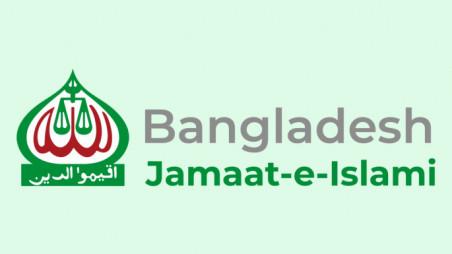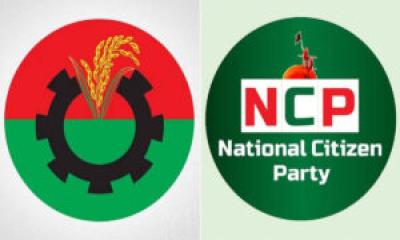● A deputy speaker must be nominated from main opposition party in parliament
● Taking measures to form a shadow cabinet headed by the main opposition leader
● Adequate time should be given to the opposition members in the parliament
There are expectations at the ground level about unity in Islamic parties
- Abdul Halim, Asst Secretary General, Jamaat
We have to overcome all differences and will be united for sake of country
- Mosaddek Billah, presidium member, IAB
Jamaat-e-Islami is moving forward to play the role of opposition in the 13th parliamentary election. The party has been holding meetings with Islamic parties behind the scenes since the 11th parliamentary election.
Due to some differences in the ideology of the religious parties, the progress of unity has not gone far so far. But after the fall of the Hasina government in the student movement on July 36, activities to form a greater Islamic unity and alliance started again. In the meantime, Islamist parties have responded well regarding the unity.
Meetings have already been held with important parties. The success of unity has also come a long way. If BNP plays the role of the ruling party, Jamaat will play the role of opposition party with Islami Alliance in the next 13th parliamentary election.
It was known that Jamaat is holding a series of meetings with all the Islamic leaders from the center ahead of the next election. He has also created a large outline to stay in the election field with Islamic parties.
According to the sources, if BNP wants to remain centered in power, Jamaat will play the role of opposition with the Islami parties. Jamaat has already given this message to the Islamic parties. Although there is already a difference of opinion in the call for unity, it has been agreed to stay in the coalition in the field of voting.
Jamaat has placed three important proposals in the constitutional reform proposal on October 9. Firstly, a deputy speaker should be nominated from the main opposition party of the parliament. Secondly, institutional arrangements should be made to form a shadow cabinet headed by the leader of the parliamentary opposition. Thirdly, sufficient time should be given to the opposition members in the parliament.
According to the sources, considering that the possibility of Jamaat's relationship with BNP is slim, the policymakers of Jamaat have already created an alternative force. Leaders of some parties, including Charmonai Pir's party Islami Andolon Bangladesh, said they have some ideological differences with Jamaat. But for the greater good, they won't stay away either. And many have opined that if the electoral unity of other Islamic parties other than Jamaat is strengthened, it will not last.
The last meeting of the like-minded parties except Jamaat was held on September 21. However, no final decision has been made. Last week, for the first time in the history of Bangladesh, the National Siratunnabi (PBUH) Mahfil was held at Suhrawardy Udyan in the capital with the participation of lakhs of people. Speakers of different creeds called upon the Islamic parties to get united to establish Islamic rule in the country. They vowed to work shoulder to shoulder for the sake of Islam and the country, forgetting all differences.
In the meantime, Jamaat has returned to normal political activities after 15 and a half years, fall of Sheikh Hasina's government on August 5. At present, the party is busy with organizational activities across the country. The top leaders of the party came to the discussion by attending separate meetings with the army chief, the president and the chief adviser.
Following this, the order banning the party was withdrawn within 23 days of the interim government being sworn in. Now they want to take part in the next election unitedly by forming a 'new platform' with different Islamic parties. Jamaat Ameer Dr. Shafiqur Rahman recently said, "We do not believe in division. All the people of the country want to unite to build a beautiful nation. That's why I'm waiting."
Apart from Jamaat and Islami Andolon Bangladesh (IAB), there is a coalition of six parties called 'Like-minded Islamic Parties'. The alliance partners are Jamiat Ulema-e-Islam, Bangladesh Khelafat Majlish (Mamunul Haque), Muslim League (Abul Khair), Khelafat Majlish (Ahmad Abdul Kader), Bangladesh Khelafat Andolon and Islami Oikya Andolan.
A leader of the like-minded Islami party said that apart from the Islami Oikya Andolon and Khilafat Andolan, four parties are currently active in their alliance. They are trying to forge an electoral unity with Islamist parties, including Jamaat.
Several leaders of several Islamic parties said that there is no clear outline of the 13th parliamentary election yet. The political situation can change at any time. Therefore, many people have questions about how far the electoral unity activities of the Islamists, including Jamaat, will go in the end. Meanwhile, Islami Andolon leader Mufti Faizul Karim and Khelafat Majlish leader Maulana Mamunul Haque said they have no problem in building unity.
Meanwhile, Jamaat is now at the center of discussion on the fall of Sheikh Hasina and the new context. The party started holding meetings with various political parties and organisations from August 15. Among them, Charmonai Pir's Islami Andolon Bangladesh, 12-Party Alliance, Zaker Party, Labor Party, Khelafat Majlish and Faraizi Andolon are notable.
Besides, Secretary General of Khelafat Majlish Maulana Mamunul Haque, Joint Secretary General of Hefazat-e-Islam Azizul Haque Islamabadi, Senior Nayeb-e-Ameer of Bangladesh Nejame Islam Party Abdul Majed Athari, Ameer of Bangladesh Khelafat Andolon Abu Zafar Qasemi, Muhtamim Moniruzzaman Kasemi of Jamia Madania, Ameer of Janaseba Andolan Fakhrul Islam exchanged views with different madrasa teachers and scholars.
Leaders of several parties who participated in these exchanges said that Jamaat-e-Islami wants a unity among the Islamists in the country, especially electoral unity. To this end, Jamaat has already established a liaison with the Islamic parties. Through this, their long-standing dispute or controversy with the Qawmi clerics has decreased.
However, according to Jamaat leaders, whether there will be electoral unity among the Islamic parties depends on Charmonai Pir's party Islami Andolon. After Jamaat, this group is considered important in terms of the support of Islamists.
Bangladesh Khilafat Andolon (a faction) chief Ameer Maulana Abu Zafar Qassemi said, "Now we have to come to a decision. It is a decision of unity. The ideals of the Prophet must be implemented through unity. An autocratic regime like Awami League should not be able to cast a shadow over its head again. That is why we have to unite on the basis of compromise, forgetting our differences."
Assistant Secretary General of Bangladesh Jamaat-e-Islami, Maulana Abdul Halim said that a new political scenario has been created after the fall of autocratic Sheikh Hasina. Now there are expectations at the ground level about unity among the Islamic parties. That is why different Islamic parties want to build a unified platform. Contacts with other like-minded parties are continuing in this regard.
Presidium member of IAB Principal Maulana Syed Mosaddek Billah Madani said, "There is still disagreement among our Islamic parties. We have to overcome them and be united sake of country."
ZH






